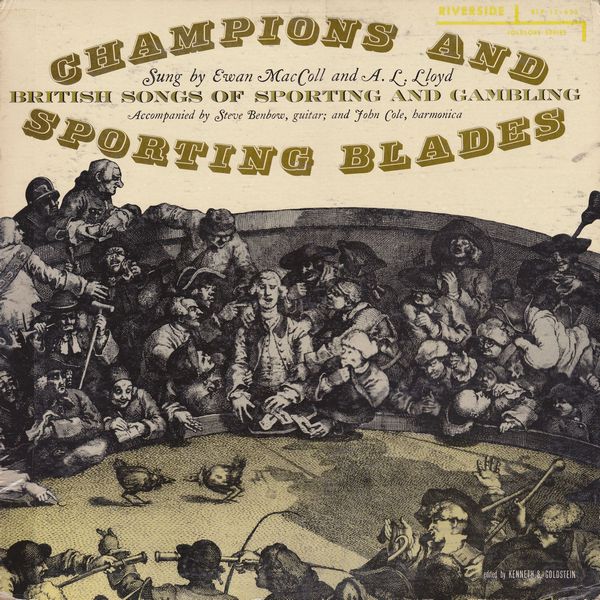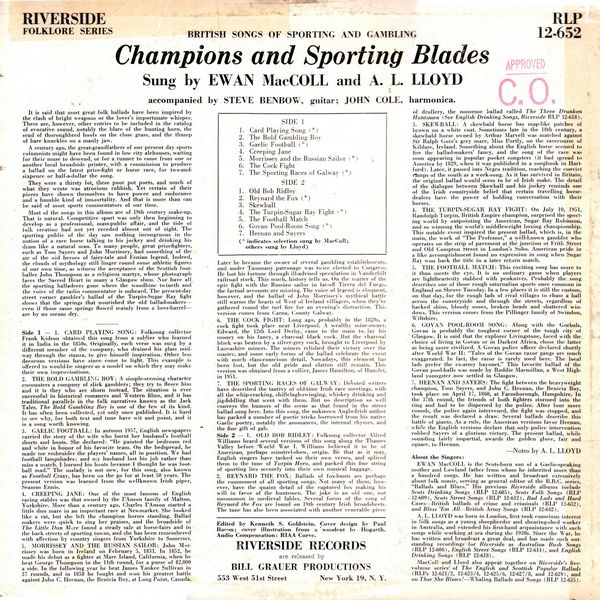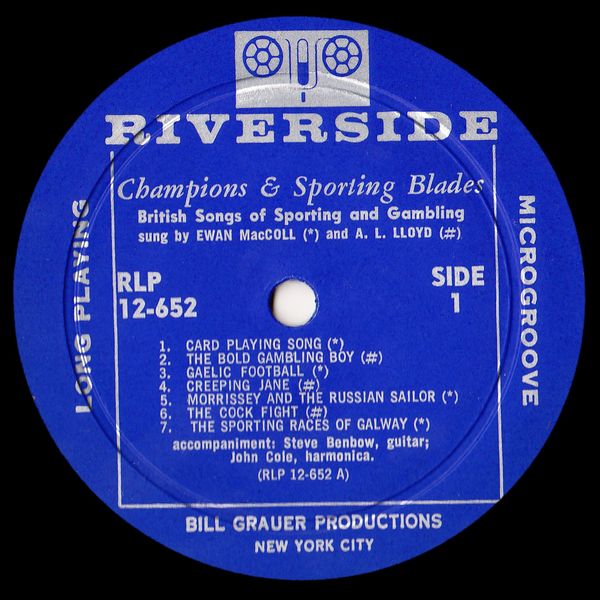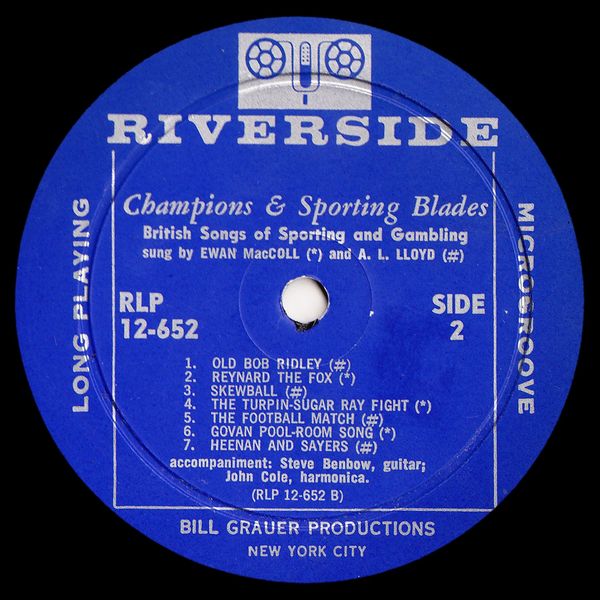

 |


 |
Sleeve Notes
It is said that most great folk ballads have been inspired by the clash of bright weapons or the lover's importunate whisper. There are, however, other entries to be included in the catalog of evocative sound, notably the blare of the hunting horn, the scud of thoroughbred hoofs on the close grass, and the thump of bare knuckles on a manly jaw.
A century ago, the great-grandfathers of our present day sports columnists might have been found in low city alehouses, waiting for their muse to descend, or for a runner to come from one or another local broadside printer, with a commission to produce a ballad on the latest prize-fight or horse race, for two-and-sixpence or half-a-dollar the song.
They were a thirsty lot, these poor pot poets, and much of what they wrote was atrocious rubbish. Yet certain of their pieces have shown themselves to have power and endurance and a humble kind of, immortality. And that is more than can be said of most sports commentators of our time.
Most of the songs in this album are of 19th century make-up. That is natural. Competitive sport was only then beginning to develop as a professional, mass-public affair, and the tide of folk creation had not yet receded almost out of sight. The sporting public of the day saw nothing incongruous in the notion of a race horse talking to his jockey and drinking his dram like a natural man. To many people, great prizefighters, such as Tom Sayers and John Morrissey, had something of the air of the old heroes of fairy-tale and Fenian legend. Indeed, the clouds of mythology still linger round some athletic figures of our own time, as witness the acceptance of the Scottish footballer John Thompson as a religious martyr, whose photograph faces the Sacred Heart in many a Glasgow slum. Nor have all the sporting balladeers gone where the woodbine twineth and the voice of the radio commentator is unheard. The present-day street corner gambler's ballad of the Turpin-Sugar Ray fight shows that the springs that nourished the old ballad-makers — even if those same springs flowed mainly from a beer-barrel — are by no means dry.
CARD PLAYING SONG: Folksong collector Frank Kidson obtained this song from a soldier who learned it in India in the 1850s. Originally, each verse was sung by a different member of the company, who drained his glass midway through the stanza, to give himself inspiration. Other less decorous versions have since come to light. This example is offered to would-be singers as a model on which they may make their own improvisations.
THE BOLD GAMBLING BOY: A simple-seeming character encounters a company of slick gamblers; they try to fleece him and it is they who are shorn instead. The situation is ever successful in historical romances and Western films, and it has traditional parallels in the folk narratives known as the Jack Tales. The Bold Gambling Boy is one of the few of its kind. It has often been collected, yet only once published. It is hard to see why, for both text and tune have wit and point, and it is a song worth knowing.
GAELIC FOOTBALL: In autumn 1957, English newspapers carried the story of the wife who burnt her husband's football shorts and boots. She declared: "He painted the bedroom red and white in honor of his favorite team. On the bedspread, he made me embroider the players' names, all in position. We had football lampshades; and my husband lost his job rather than miss a match. I burned his boots because I thought he was football mad." The malady is not new, for this song, also known as Football Crazy, has been on the go for at least 50 years. The present version was learned from the well-known Irish piper, Seamus Ennis.
CREEPING JANE: One of the most famous of English racing stables was that owned by the I'Anson family of Malton, Yorkshire. More than a century ago, Charles I'Anson started a little dun mare in an important race at Newmarket. She looked like a rat, but she left the champion horses standing. Ballad makers were quick to sing her praises, and the broadside of The Little Dun Mare found a steady sale at horse-fairs and in the back streets of, sporting towns, and she has been remembered with affection by country singers from Yorkshire to Somerset.
MORRISSEY AND THE RUSSIAN SAILOR: John Morrissey was born in Ireland on February 5, 1831. In 1852, he made his debut as a fighter at Mare Island, California, when lie beat George Thompson in the 11th round, for a purse of $2,000 a side. In the following year he beat James Yankee Sullivan in 37 rounds, and in 1858 he fought and won his greatest battle against John C. Heenan, the Benicia Boy, at Long Point, Canada. Later he became the owner of several gambling establishments and under Tammany patronage was twice elected to Congress He lost his fortune through ill-advised speculation in Vanderbilt railroad stock. This much, history tells us. On the matter of the epic fight with the Russian sailor in far-off Tierra del Fuego. the factual accounts are missing. The voice of legend is eloquent, however, and the ballad of John Morrissey's mythical battle still warms the hearts of West of Ireland villagers, when they've gathered round the turf fire for an evening's distraction. This version comes from Carna, County Galway.
THE COCK FIGHT: Long ago, probably in the 1820s, a cock fight took place near Liverpool. A wealthy mine-owner. Edward, the 12th Lord Derby, came to the main to lay his money on his fancy, a charcoal black cock. But the charcoal black was beaten by a silver-grey cock, brought to Liverpool by Lancashire miners. The miners relished their victory over the master, and some early forms of the ballad celebrate the event with much class-conscious detail. Nowadays, this element has been lost, but the old pride and elation still remain. This version was obtained from a collier, James Hamilton, of Hunslet, in 1951.
THE SPORTING RACES OF GALWAY: Devoted writers have described the tantivy of old-time Irish race meetings, with all the whip-cracking, shillelagh-swinging, whiskey drinking and jig-fiddling that went with them. But no description so well conveys the humors of the scene as that found in the street ballad sung here. Into this song, the unknown Anglo-Irish author has packed a number of poetic tricks borrowed from his native Gaelic poetry, notably the assonances, the internal rhymes, and the fine gift of gab.
OLD BOB RIDLEY: Folksong collector Alfred Williams heard several versions of this song along the Thames Valley before World War I. Williams believed it to be of American, perhaps minstrel-show, origin. Be that as it may. English singers have tacked on their own verses, and spliced them to the tune of Turpin Hero, and packed this fine string of sporting lies securely into their own musical baggage.
REYNARD THE FOX: Ballads of fox-hunts are perhaps the commonest of all sporting songs. Not many of them, however, have the quaint detail of the captured fox making his will in favor of the huntsmen. The joke is an old one, not uncommon in medieval fables. Several forms of the song of Reynard the Fox are found on 19th century Irish broadsheets. The tune has also been associated with another venerable piece of drollery, the nonsense ballad called The Three Drunken Huntsmen (See English Drinking Songs, Riverside RLP 12-618).
SKEWBALL: A skewbald horse has map-like patches of brown on a white coat. Sometimes late in the 18th century, a skewbald horse owned by Arthur Marvell was matched against Sir Ralph Gore's grey mare, Miss Portly, on the racecourse of Kildare, Ireland. Something about the English horse seemed to fire the ballad-makers' fancy, and the song of the race was soon appearing in popular pocket songsters (it had spread to America by 1829, when it was published in a songbook in Hartford). Later, it passed into Negro tradition, reaching the convict ramps of the south as a work-song. As it has survived in Britain, the original ballad would seem to be of Irish make. The detail of the dialogue between Skewball and his jockey reminds one of the Irish countryside belief that certain travelling horse-dealers have the power of holding conversation with their horses.
THE TURPIN-SUGAR RAY FIGHT: On July 10, 1951; Randolph Turpin, British Empire champion, surprised the sporting world by outpointing the American, Sugar Ray Robinson, and so winning the world's middleweight boxing championship. This notable event inspired the present ballad, which is, in the main, the work of "The Professor," a well-known gambler who operates on the strip of pavement at the junction of Frith Street and Old Compton Street in London's Soho. American pride in a like accomplishment found no expression in song when Sugar Ray won back the title in a later return match.
THE FOOTBALL MATCH: This exciting song has more to it than meets the eye. It is no ordinary game when players are lightheartedly stabbed with penknives. Probably the song "describes one of those rough saturnalian sports once common in England on Shrove Tuesday. In a few places it is still the custom, on that day, for the rough lads of rival villages to chase a ball across the countryside and through the streets, regardless of hacked shins, bloody noses, broken heads and shattered windows. This version comes from the Pillinger family of Swindon, Wiltshire.
GOVAN POOL-ROOM SONG: Along with the Gorbals, Govan is probably the toughest corner, of the tough city of Glasgow. It is said that the explorer Livingstone, faced with the choice of living in Govan or in Darkest Africa, chose the latter as being more civilized. A Govan police officer declared shortly after World War II: "Tales of the Govan razor gangs are much exaggerated. In fact, the razor is rarely used here. The local lads prefer the ex-army bayonet." This favorite ballad of the Govan pool-halls was made by Roddie Macmillan, a West Highland youngster now settled in Glasgow.
HEENAN AND SAYERS: The fight between the heavyweight champion, Tom Sayers, and John C. Heenan, the Benicia Boy, took place on April 17, 1860, at Farnsborough, Hampshire. In the 37th round, the friends of both fighters stormed into the ring and had to be dispersed by the police. After four more rounds, the police again intervened, the fight was stopped, and the result was declared a draw. Several ballads describe this battle of giants. As a rule, the American versions favor Heenan, while the English versions declare that only police intervention robbed Sayers of a glorious victory. The present ballad, while sounding fairly impartial, awards the golden glove, fair and square, to Heenan.
— Notes by A. L. LLOYD
About the Singers:
EWAN MacCOLL is the Scots-born son of a Gaelic-speaking mother and Lowland father from whom he inherited more than a hundred songs. He has written and broadcast extensively about folk music, serving as general editor of the B.B.C. series, "Ballads and Blues." His previous Riverside albums include Scots Drinking Songs (RLP 12-605), Scots Folk Songs (RLP 12-609), Scots Street Songs (RLP 12-612), Bad Lads and Hard Cases-British ballads of crime and criminals (RLP 12-632), and Bless 'Em All-British Army Songs (RLP 12-642).
A. L. LLOYD was born in London, first took conscious interest in fo1k songs as a young sheepherder and shearing-shed worker in Australia, and' extended his first-hand acquaintance with such songs while working at sea during the 1930s. Since the War, he has written and broadcast a great deal, and has made such outstanding recordings 4or Riverside as Australian Bush Songs (RLP 12-606), English Street Songs (RLP 12-614), and English Drinking Songs (RLP 12-618). MacColl and Lloyd also appear together on Riverside's five-volume series': of The English, and Scottish Popular Ballads (RLPs 12-621/2, 12-623/4, 12-625/6, 12-627/8, and 12-629), and on Thar She Blows! — Whaling Ballads and Songs (RLP 12-635).